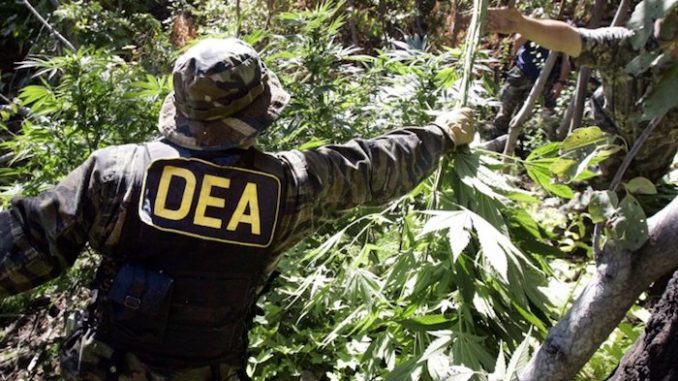
The Drug Enforcement Administration (DEA) has been forced to admit that nobody has ever died of a cannabis overdose.
The admission comes after the Charlotte-Mecklenburg Police Department last weekend suggested that marijuana use was a key factor in police officers’ decision to approach Keith Lamont Scott in a confrontation that turned fatal.

BYPASS THE CENSORS
Sign up to get unfiltered news delivered straight to your inbox.
You can unsubscribe any time. By subscribing you agree to our Terms of Use
Latest Video
Thecannabist.co reports: Plainclothes officers were sitting in an unmarked car waiting to serve a warrant in an unrelated case when Scott’s car pulled in nearby, according to a police summary of the incident. The officers say they saw him holding what looked like a marijuana “blunt.”
“Officers did not consider Mr. Scott’s drug activity to be a priority at the time,” according to the incident summary, but police say they later saw a gun. “Due to the combination of illegal drugs and the gun Mr. Scott had in his possession, officers decided to take enforcement action for public safety concerns.”
When Scott didn’t comply with the officers’ commands, police say, they shot and killed him.
It’s not the first time low-level marijuana possession has escalated to a fatal police encounter. Last August, 19-year-old Zachary Hammond was fatally shot by police in Seneca, South Carolina, as he tried to flee from an attempted marijuana bust. In 2012, officers killed unarmed Bronx teenager Ramarley Graham as he tried to flush pot down the toilet. Trevon Cole was doing the same thing when police killed him in Las Vegas in 2010 during a drug raid at which no weapons were found.
As the Drug Enforcement Administration notes, nobody has ever died of a marijuana overdose. But aggressive enforcement of drug laws has led to some deaths. Growing efforts to decriminalize or legalize marijuana in part seek to reduce these kinds of police encounters that can turn fatal.
Places that have decriminalized possession of small amounts of marijuana treat offenses essentially like parking tickets. Data shows that decriminalization typically leads to drastic reductions in the number of marijuana-related arrests. For instance, the month after the New York City Police Department announced it would treat low-level drug possession as a noncriminal violation instead of a misdemeanor, arrests plummeted 75 percent year over year, according to the Associated Press.
But as the cases above vividly illustrate, decriminalization doesn’t eliminate violent encounters. Marijuana was decriminalized in Nevada when Cole was killed. It was decriminalized in New York state when Graham was killed. And it’s decriminalized in North Carolina, where Scott was killed.
This is one reason many drug policy reformers say decriminalization isn’t enough. “Legalization is really the big key” in preventing fatal encounters over marijuana use, said Sharda Sekaran of the Drug Policy Alliance, a reform group. “We had de-facto decriminalization in New York state, but stop-and-frisk still happened” in New York City.
“Decriminalized” isn’t the same as “legal,” after all. If a police officers see a person with a small quantity of marijuana in a state that has decriminalized it, the officer can still choose to confront that person and cite them for possession, no matter how small the actual penalty may be.
Sekaran notes that places like Colorado saw their marijuana-related arrest rates drop dramatically after legalization.
Black Americans are much more likely to be at the receiving end of drug-related police encounters. A 2013 American Civil Liberties Union report noted that while blacks and whites smoke weed at similar rates, blacks are four times more likely to be arrested for it.
Marijuana enforcement can be deadly for police officers, too. In 2011, members of a narcotics task force raided the home of a military veteran suspected of growing marijuana plants to self-medicate for post-traumatic stress disorder. After hearing his door broken down the veteran, Matthew Stewart, grabbed a handgun to defend himself and killed one of the task-force officers in the ensuing gunfight.
It’s not just initial police confrontations that can turn deadly as a result of suspected marijuana use. In 2013, the body of North Dakota college student named Andrew Sadek was found at the bottom of a river with a backpack full of rocks and a bullet wound in his head. His family says his death was related to his informant work, and have sued the sheriff’s department for wrongful death.
In a state where marijuana isn’t fully legal, the simple presence of pot is enough to suggest a connection between the person holding it and the black market economy supplying it. That alone may be enough for an officer to initiate an encounter with that person in the hope of making inroads into that economy and taking down some of the larger players in it.
Decriminalizing marijuana use, but not legalizing it completely, still allows for the “invasion of peoples’ privacy and violations of their liberty. And it takes their lives,” said the Drug Policy Alliance’s Sekaran. “Ending marijuana prohibition wont get rid of all that, but it will take away a big tool used by law enforcement in real corrupt ways.”
The deaths of Scott, Hammond and others are a reminder that as long as a drug remains illegal, its mere presence is enough to trigger an encounter with law enforcement that could turn out deadly for individuals on either side of it.


